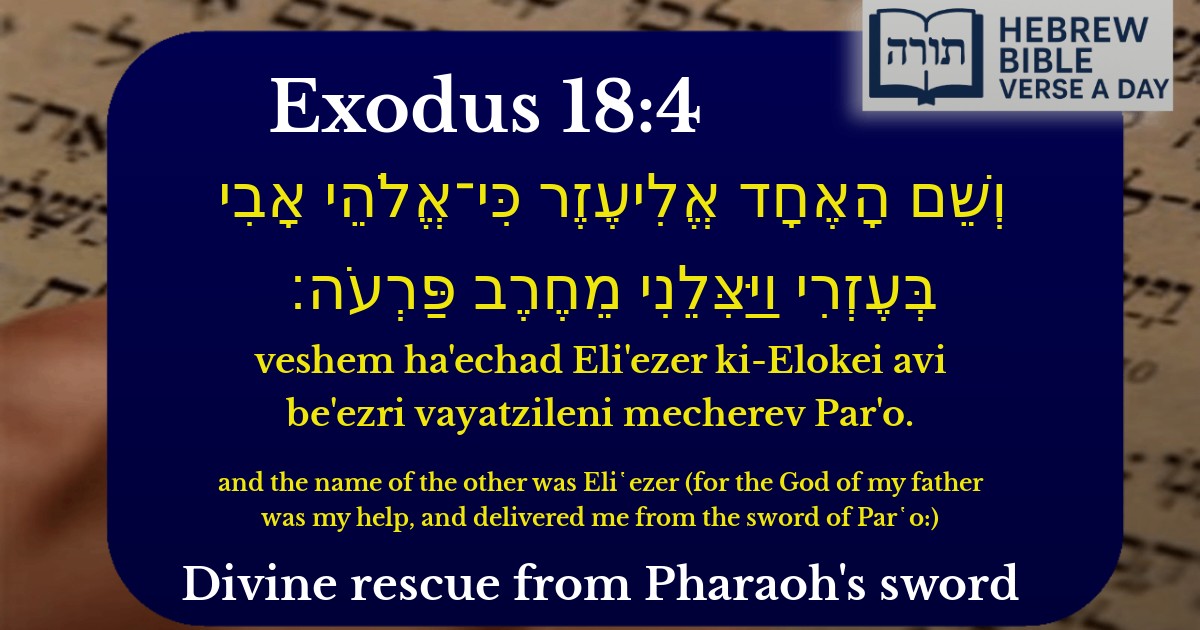Join Our Newsletter To Be Informed When New Videos Are Posted
Join the thousands of fellow Studends who rely on our videos to learn how to read the bible in Hebrew for free!
Hebrew Text
וְשֵׁם הָאֶחָד אֱלִיעֶזֶר כִּי־אֱלֹהֵי אָבִי בְּעֶזְרִי וַיַּצִּלֵנִי מֵחֶרֶב פַּרְעֹה׃
English Translation
and the name of the other was Eli῾ezer (for the God of my father was my help, and delivered me from the sword of Par῾o:)
Transliteration
Veshem ha'echad Eli'ezer ki-Elokei avi be'ezri vayatzileni mecherev Par'o.
Hebrew Leining Text
וְשֵׁ֥ם הָאֶחָ֖ד אֱלִיעֶ֑זֶר כִּֽי־אֱלֹהֵ֤י אָבִי֙ בְּעֶזְרִ֔י וַיַּצִּלֵ֖נִי מֵחֶ֥רֶב פַּרְעֹֽה׃
וְשֵׁ֥ם הָאֶחָ֖ד אֱלִיעֶ֑זֶר כִּֽי־אֱלֹהֵ֤י אָבִי֙ בְּעֶזְרִ֔י וַיַּצִּלֵ֖נִי מֵחֶ֥רֶב פַּרְעֹֽה׃
🎵 Listen to leining
Parasha Commentary
📚 Talmud Citations
This verse is not quoted in the Talmud.


Explanation of the Verse
The verse states: "וְשֵׁם הָאֶחָד אֱלִיעֶזֶר כִּי־אֱלֹהֵי אָבִי בְּעֶזְרִי וַיַּצִּלֵנִי מֵחֶרֶב פַּרְעֹה" ("and the name of the other was Eliezer, for the God of my father was my help, and delivered me from the sword of Pharaoh"). This is Moshe Rabbeinu's explanation for naming his son Eliezer, expressing gratitude to Hashem for saving him from Pharaoh's sword.
Rashi's Commentary
Rashi (Shemot 18:4) explains that Moshe named his son Eliezer as a testimony to the miracle Hashem performed for him when he fled from Pharaoh after killing the Egyptian taskmaster. Pharaoh sought to execute Moshe with the sword, but Hashem saved him. The name Eliezer (אֱלִיעֶזֶר) literally means "My God is my help," reflecting Moshe's recognition of divine intervention.
Midrashic Insights
The Midrash (Shemot Rabbah 4:2) elaborates that Moshe was sentenced to death by Pharaoh's sword, but the sword had no effect on him—either it miraculously broke, or his neck became as hard as ivory. This miracle demonstrated Hashem's protection over Moshe, even before his official role as the redeemer of Israel.
Rambam's Perspective
Rambam (Hilchos Teshuvah 9:1) emphasizes the importance of recognizing and acknowledging miracles, as Moshe did by naming his son Eliezer. This act serves as a perpetual reminder of Hashem's salvation and reinforces the principle of hakaras hatov (recognizing kindness).
Key Themes